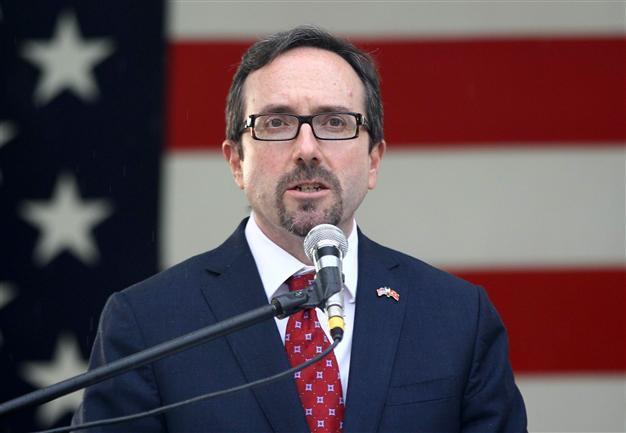US committed to ‘unified’ Syria, in communication with PYD
ANKARA

AFP photo
The U.S. ambassador to Ankara has underlined Washington’s commitment to a future Syria that is “unified,” adding that it has been clearly conveying its expectations to Syria’s Democratic Union Party (PYD) with regard to practices in areas that the group has seized control of.Whoever controls border regions in Syria should be committed to fighting the Islamic State of Iraq and the Levant (ISIL), U.S. Ambassador John Bass also told reporters late on July 2.
When asked about his country’s potential reaction to any unilateral move by Turkey to create a safe zone inside Syrian territory, Bass was cautious, dubbing the question “hypothetical.”
“What I will say is that both Turkey and United States have a shared concern about the presence of Daesh on Turkey’s border, in northwestern Syria, just as we have a shared concern about the presence of Daesh on the border in north central Syria,” he said, using the Arabic acronym for ISIL.
Ankara and Washington are continuing to work together to address the threat posed by ISIL as part of efforts by the international coalition, the ambassador added.
“I think that from our perspective it is very important that whoever is controlling the border regions in Syria is committed to fighting Daesh and preventing it from controlling that territory. Daesh [has been able] to replace some of its losses through smuggling from Turkey despite the strong efforts of the Turkish government and the Turkish people to address that,” Bass said when asked whether the U.S. shares Ankara’s concerns about the PYD.
Ankara has looked askance as PYD forces, backed by U.S.-led air strikes, have pushed back ISIL fighters from Syrian towns near the Turkish border.
“Number two, [whoever controls the border] must be committed to a future Syria that is unified and democratic,” Bass added, in a veiled acknowledgement of Turkey’s fears about the creation of an autonomous Kurdish state in Syrian territory.
“Number three, [whoever controls the border] must enable the citizens of those regions to administer their own affairs and permit people who may have been displaced by conflict to return home as soon as they feel safe enough to do so. There is a very consistent approach to all three of those from the Turkish government and from the United States government and we are very clear in communicating our expectations to the PYD about the behavior they should be exercising in the areas of Syria where they have recently pushed Daesh off the border,” he also said.
US envoy’s remarks positive: Deputy PM
Deputy Prime Minister Numan Kurtulmuş expressed his satisfaction over the remarks by U.S. Ambassador to Turkey John Bass. “The statements of the ambassador indicate that they have well understood our position regarding Syria. This is satisfactory from this perspective,” Kurtulmuş said, in a meeting with Ankara bureau chiefs late July 2.
Bass’ statement came amid the Turkish government’s decision to reinforce its military presence along the Syrian border after clashes between the PYD and ISIL intensified. ISIL’s advance into northwestern Syria has been seen as a threat by Turkey, with concerns it could trigger a new influx of refugees into Turkey.
Criticizing the West’s failure to create a concerted policy on Syria, Kurtulmuş said, “Look, Iraq has come to the edge of being divided into three parts. Syria’s disintegration would be worse; it could be divided into 33 parts if things continue like this. Syria has become a confederation of numerous terror organizations. There are so many terror organizations that we do not know their names; but of course the worst one is Daesh.”
Kurdish fighters backed by U.S.-led airstrikes have been on the offensive against ISIL in northern Syria for months, and now control a long stretch along the Syria-Turkey border. Turkey, which has battled a decades-long Kurdish insurgency, has viewed the PYD’s advance with growing concern and has warned that it will not tolerate the establishment of a Kurdish state in Syria.
Ankara is also concerned about reports that Kurdish rebels are chasing other ethnic groups, such as Arabs and Turkmens, out of the areas under their control.
















